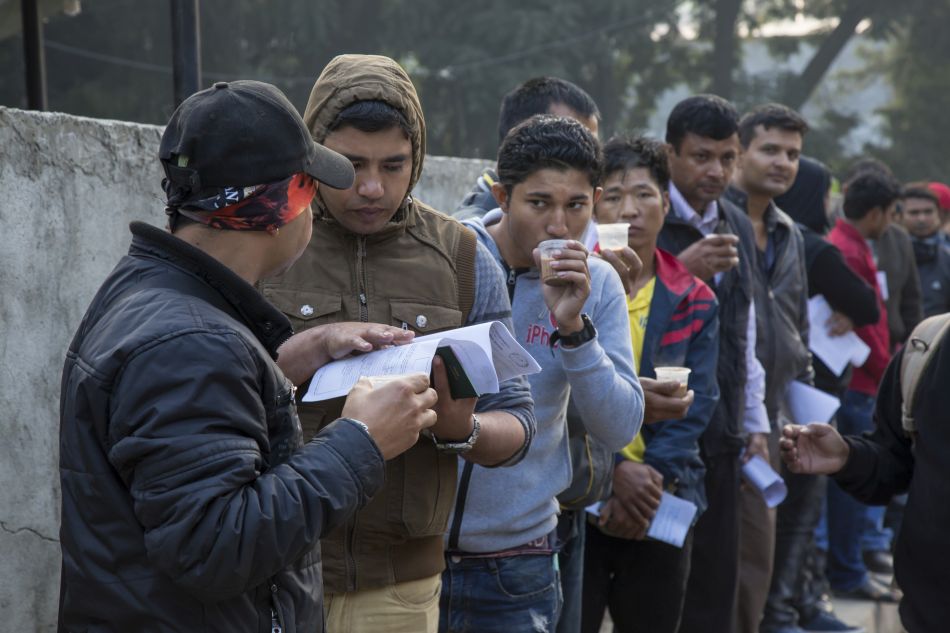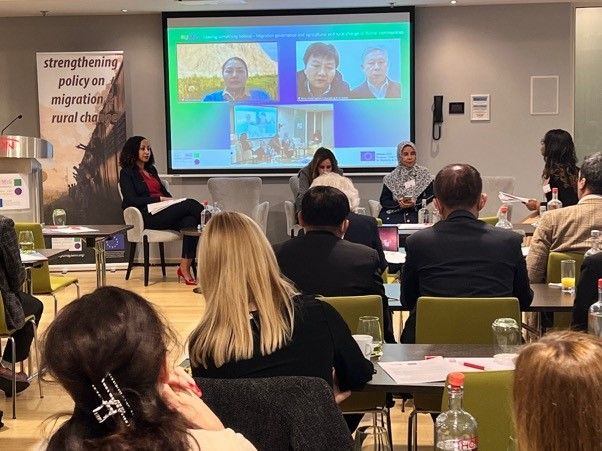A ‘positive migration’ approach in policy and governance can help harness the benefits of migration for sustainable development
By Pacem Kotchofa, Postdoctoral Fellow – Social Science, and Alan Nicol, Strategic Program Director – Water, Growth, and Inclusion

Photo credit: Sharad Maharjan/IWMI
Unable to find a job in Kyrgyzstan, Khadija migrated to Russia. With the money she earned working in a rural hospital, she was able to send her three children to school and build a house back home. Returning 15 years later, she opened a health diagnostic service in her village, and, in time, local authorities asked her to head a new local hospital.
For numerous rural women like Khadija, one of many interviewed by the AGRUMIG project, few livelihood options exist other than to migrate for work. Factors outside their control, such as climate change, poverty and conflict, can undermine their productivity and livelihood security. But migration can also be empowering, providing opportunities to earn an income and send money home (financial remittances), as well as acquire new skills, build networks, and subsequently contribute to substantial transformation and development in home communities (through social remittances).
December 18 is International Migrants Day and comes shortly after AGRUMIG held an end-of-project meeting in Brussels. Opening the meeting, IWMI’s Alan Nicol stated that although migration in many places remained below pre-Covid levels, given its intrinsic role in the global economy, migration has substantially bounced back. This was echoed by Tineke Strik, Professor of Citizenship and Migration Law at Radboud University in the Netherlands and a Member of the European Parliament, who said in her address, “As long as better opportunities are available elsewhere, migration, whether regulated or not, won’t stop.”

The challenge for those working on migration policy, however, is to ensure that future migration is better governed – meaning movement is safer and rewards are greater and more equitably distributed. Despite international efforts, there is much work to do. The Global Compact for Safe, Orderly and Regular Migration, adopted by the international community in Marrakech in 2018, states that ‘migration is a multi-dimensional reality that cannot be addressed by one government policy sector alone.’ Covid-19 severely disrupted migration patterns soon afterward, and the compact has been largely gathering dust ever since.
Many major migration risks remain, for women in particular. Speaking at the Brussels meeting, Inkeri von Hase, Policy Specialist on Gender and Migration at UN Women, indicated that a staggering 90% of women and girls migrating along the Mediterranean route – many to Europe – are victims of serious gender-based violence. Elsewhere, the gendered impacts of huge male outmigration are significant in other ways. In Nepal, for instance, declining farm yields and limited employment prospects in domestic markets force large numbers of young men to seek work abroad, leading to the ‘feminization’ of agriculture. This leaves women to take on farm labor and decision-making roles but without being granted formal entitlement to land or access to finance.
The Brussels meeting emphasized many of the challenges. However, it also pointed toward the need for a more integrated, one-systems approach that would incorporate rural development and migration policy alongside stronger ‘sending’ and ‘receiving’ country coordination and support. The 2030 Agenda for Sustainable Development recognizes migration – by women and men – as a powerful driver of sustainable development, filling labor gaps, generating tax revenue and contributing to economic growth, innovation and entrepreneurship. Yet without a stronger, more systemic governance framework, many benefits are failing to be realized, and risks are increasing again.
Growing climate impacts in rural areas are one such area of concern. For migrants like Khadija and others, remittances can provide some security against future climate and labor market risks. But in a more structural sense, new knowledge, behaviors and identities that returnees bring home with them can help the communities to which they return also shift mindsets and change cultural norms in ways that benefit everyone. One returnee to Thailand brought back savings and new ideas from working in Israel and South Korea to improve irrigation practices, introduce new organic farming techniques to his community and set up online marketing in Udonthani province.
We need a ‘positive migration’ approach
Migration needs to be framed in new, more positive ways and not as a problem to be solved. AGRUMIG successfully identified policy and practice interventions that harness the economic, social and environmental potential of migration to stimulate more sustainable, inclusive and equitable growth in rural areas, reinforcing a positive migration philosophy. This research evidence presented in Brussels across AGRUMIG’s seven countries and in multiple dialogues with policymakers and practitioners helped identify new governance action plans, key recommendations from which include:
- Establishing disaggregated and gender-sensitive migration data to ensure that women’s labor, both at home and abroad, is effectively captured and reflected in public discourse.
- Promoting the use of accurate and relevant data in constructing and implementing policies and practices on both migration and rural change that could help mediate future development approaches and achieve more positive impacts.
- Implementing migration governance policies in synergy with broader economic policies of countries or regions, emphasizing the intersectionality of interventions with agricultural and rural development policies.
- Better equipping migrants to know their rights and duties in host countries through well-designed pre-departure training, and supporting their financial literacy and investment decision-making of their remittances.
The theme of this year’s International Migrants Day, ‘it takes a community’, underlines the complexity of the migration phenomenon. Based on AGRUMIG research, we argue that a collective approach to migration governance is essential, building on the Global Compact and continuing to deliver greater rights protection, human security and knowledge sharing at the heart of migration governance strategies.

